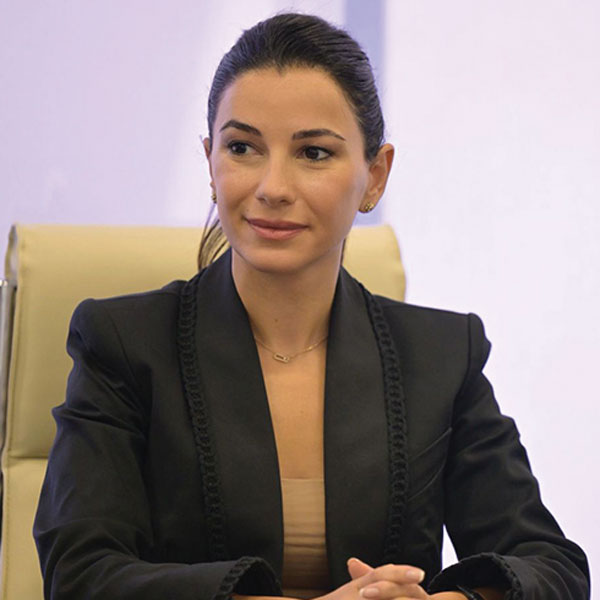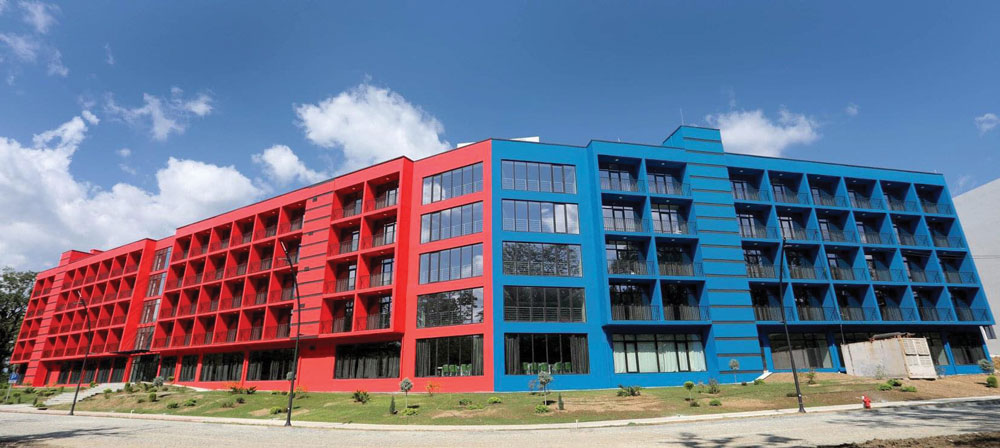Some say every site selection begins with a leader’s tourist experience of a place. The same might be said of talent’s perspective in this new era of remote work, digital nomads and round-the-clock operations.
A rise in quality-of-life infrastructure is converging with increasing digital economy competence to make a strong business case for Georgia.
Let’s begin with arrival. A growing array of 78 airlines now operate in Georgia, serving 120 destinations worldwide. The total of 20,766 passenger and cargo flights operated in the country during the first seven months of 2025 was 16% higher than the number of flights performed in the same period in 2024. The 19,818 tons of cargo and mail processed during those same seven months was 50% higher than the same period in 2024.
Passenger volume also was up by 13%, part of the reason the first half of 2025 saw nearly $2 billion in tourism revenue flow into the country. In the 2025 summer season Georgian Airports saw an average of 745 flights per week.
Among the international airlines now landing and departing in Georgia are four airlines from the United Arab Emirates that currently operate nearly 50 flights a week between the UAE and the country of Georgia. In July, another UAE airline, Etihad Airways, said it will add 14 more flights to the weekly menu of 3.5-hour UAE-Georgia flight options beginning in March 2026.

“The entry of such a strong international brand airline into Georgia will further strengthen the country’s recognition and contribute to the further development of the tourism sector.”
— Georgia Minister of Economy and Sustainable Development Mariam Kvrivishvili, July 2025, on the announcement of new UAE-Georgia flights from Etihad Airways
“This is another success for our country and a result of our sound economic policy, including diversification, and recognition of the aviation industry,” said Georgia Minister of Economy and Sustainable Development Mariam Kvrivishvili at the Etihad announcement. “The entry of such a strong international brand airline into Georgia will further strengthen the country’s recognition and contribute to the further development of the tourism sector.”
The Ties That Multiply
The flight growth pairs well with dramatic growth in the hospitality sector in Georgia, with 17 new hotels opening in 2025 and more than 300 slated to open between 2024 and 2028, including the forthcoming Wyndham Grand Batumi Gonio all-inclusive hotel and residence development in the Adjara region on the Black Sea near Batumi. But tourism isn’t all that’s on the rise in Georgia.
Among other investments, Abu Dhabi Ports Group is the primary backer of expansion at Tbilisi Dry Port, where the $21 million first phase of development is now operational. Meanwhile, one of the leading real estate companies in the Emirates, Eagle Hills, aims to bring a $6 billion mixed-use investment in for a landing in two locations: a project called Krtsanisi Park on nearly 1,460 acres in Ponichala near the nation’s capital of Tbilisi, and another project on more than 640 acres in Gonio, near Batumi. Work is anticipated to begin in both locations in early 2026. Meanwhile, Eagle Hills in August established a new sales office in Tbilisi.
“The Eagle Hills project represents a strategic investment in Georgia’s future,” says Minister Kvrivishvili. “It highlights the country’s growing appeal as a platform for high-impact developments and signals the untapped potential our economy holds. This is not just a real estate venture — it’s a catalyst for broader growth, unlocking new opportunities in tourism, retail, and services, while reinforcing Georgia’s position as a regional hub for international investment.”
Mohamed Alabbar, the influential chairman of Eagle Hills and founder of Emaar Properties, has overseen more than $350 billion in development value in 18 countries, including around the Burj Khalifa and Dubai Mall in Dubai as well as in such places as Albania, Indonesia, Morocco, Croatia, Budapest, Bahrain and Ethiopia. The publication International Investment in March reported that Alabbar was captivated by Tbilisi’s culture and Batumi’s energy and beauty. “He further emphasized Georgia’s economic stability and development, predicting that Eagle Hills’ significant investments will attract other investors,” said the publication, just as they have in other countries.
Alabbar is not alone among foreign business leaders with an eye on Georgia.
From January through July 2025, exports from the country of Georgia increased by 8.9% to a record of more than US$3.8 billion, as foreign trade turnover grew by 10.3% to set its own record of more than $14.1 billion.
Those seven months followed a 2024 that saw its own records: 7.8% export growth to reach $6.6 billion and 8.1% trade turnover growth to attain $23.4 billion for the year. Overall incoming FDI of $6.7 billion between 2021 and 2024 was led most recently by companies from the UK and the Netherlands.
Emerging Location for Global Business Services
A substantial portion of that global FDI interest is focused on services, specifically global business services (aka business process outsourcing or BPO) and information technology services. Service exports in these sectors soared from $110 million in 2020 to nearly $700 million in 2024.
A 2024 report about up-and-coming European regions for global business services and shared services operations from location consultancy OCO Global noted that Georgia is among a handful of countries “gaining recognition for their potential to become future GBS hubs.”
Among the country’s advantages for BPO and IT services:
- BPO and IT companies investing at least $750,000 and creating 200 new jobs for BPO or 50 new jobs for IT get an FDI grant equivalent to 15% cash back on their investment. Moreover, International Company Status for IT companies provides a preferential tax regime that includes a reduced corporate tax rate of 5%, 5% personal income tax and 0% dividends tax, reduced from 15%, 20% and 5% standard rates, respectively.
- The country’s strategic location in terms of time zone (GMT +4 hours, or 8 hours ahead of Eastern Time on the U.S. East Coast) facilitates round-the-clock, round-the-world service handoffs.
- A multilingual, skilled and competitively priced workforce features some 574,000 speakers of English, German, French or Italian, with many speaking two or three of those languages in addition to Georgian.
- High-speed internet and robust network connectivity. In addition to having one of the fastest download speeds in the southern Caucasus region, the country aims to provide broadband internet to every household by this year via its $80 million Log-In Georgia infrastructure investment program.
Enterprise Georgia reports that BPO and IT outsourcing employ 46,000 people in Georgia, who help those sectors add $1.67 million in value and whose export of services is valued at more than $2.5 billion. A concerted effort to train 3,000 IT specialists was completed in 2022. A follow-up program aims to upskill 5,000 specialists by 2026. Meanwhile, average monthly salaries are 30% to 40% lower than Central Europe across all professions.
A report prepared by Shared Services and Outsourcing Network (SSON) says the country of 3.9 million people and its capital city of Tbilisi (1.2 million) still offer the same global connectivity and cultural integration that being part of the Silk Road trade route did centuries ago, enhanced by receiving EU candidate status in 2023.
“Despite the strengths of Georgia, according to SSON R&A’s Shared Services & BPO Atlas, the country only houses 18 delivery centers,” the report found. “However, Georgia is emerging as a previously undiscovered prime center location, with ample opportunity to grow. In recent years, more and more companies, such as TP [Teleperformance] and Concentrix, are discovering the country’s business potential.”
In the Global Services Location Index (GSLI), Georgia ranked No. 8 in Europe and No. 24 globally, affirming its growing status as a growing global BPO/IT destination and reflecting its strong performance across four key dimensions: financial attractiveness, talent availability and skills, business environment and digital readiness.
Companies Search for Talent, Talent Searches for Home
The talent picture is enhanced, SSON finds, by the country’s liberal visa policy and its “Remotely from Georgia” program to attract digital nomads, which helped raise the number of IT talents working in the country from 4,600 in 2021 to 30,200 in 2023.

Modeled after the Technical University of Munich, Kutaisi International University will host 40,000 students at full capacity.
“One of the key reasons Georgia has become an attractive destination for digital nomads is the simple procedure for long-term stays,” Enterprise Georgia – Invest in Georgia CEO Mikheil Khidureli told SSON. “Citizens from 98 countries can stay in Georgia visa-free for up to one year. Additionally, citizens from 50 countries who hold visas or residence permits can enter Georgia without a visa, under specific terms and conditions. This liberal visa regime has significantly contributed to attracting nomads and remote workers to the country.”
But homegrown talent continues to grow as well, nurtured by industry-friendly curricula at such schools as Tbilisi State University, Ilia State University and the recently opened Kutaisi International University (KIU). In all, the country hosts 64 higher education institutions and 66 vocational education and training (VET) centers.

Tbilisi is home to 1.1 million people with a median age of 38.
Photo courtesy of Invest in Georgia
Modeled after the Technical University of Munich, KIU will host 40,000 students at full capacity. Among other outreach programs (including AI training), the university in February 2025 signed an MOU with China’s Huawei to become the first higher education institution in Georgia to host the “Huawei ICT Academy,” in line with the university gradually developing into a tech hub. As part of the agreement, students will have the unique opportunity to intern at Huawei, with the potential for future employment.
Solid Foundation
There’s more than talent to attract Huawei to Georgia. The country was ranked No. 1 for business location, No. 2 in operational efficiency, No. 3 in regulatory framework, No. 3 in labor and No. 6 for favorable tax environment in the 2024 World Bank Business Ready (B-READY) rankings. When scores across all of the index’s pillars were aggregated, Georgia finished at No. 3 among the 50 countries examined, just behind No. 1 Singapore and No. 2 Estonia, and ahead of such competitors as Hungary, Portugal, the Slovak Republic and Bulgaria.
A forecast from the International Monetary Fund released in July found that not only did Georgia experience 8.3% economic growth during the first half of 2025, but among the countries of the region and Europe, Georgia will have the highest economic growth between 2025 and 2030, averaging 5.4%. The country saw red-hot 9.4% economic growth in 2024, third highest in the world.
“The economic growth indicators are quite diversified at the sectoral level,” said Georgia Deputy Minister of Economy and Sustainable Development Vakhtang Tsintsadze. “Information and communication, manufacturing, education, transport and storage, and financial and insurance sectors contributed significantly to the growth … We expect that the existing positive trends of economic growth will be maintained and strengthened until the end of the year, and Georgia will be able to close 2025 with high economic growth.”
Talent development and the quality-of-life amenities designed to attract and retain that talent appear to be the infrastructure of future growth for Georgia.
This Investment Profile was produced under the auspices of Invest in Georgia, the economic development agency under the Georgia Ministry of Economy and Sustainable Development. For more information, visit www.investingeorgia.org or email Info@enterprise.gov.ge.

